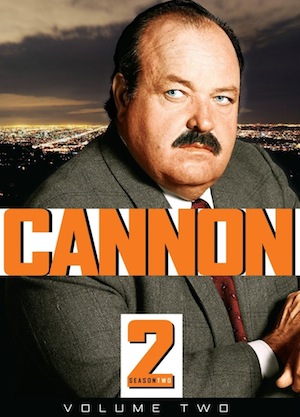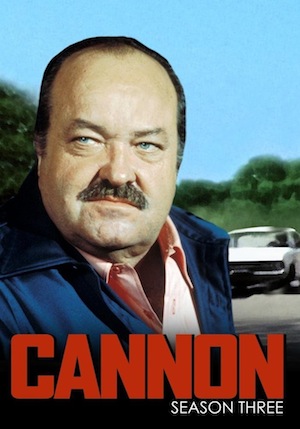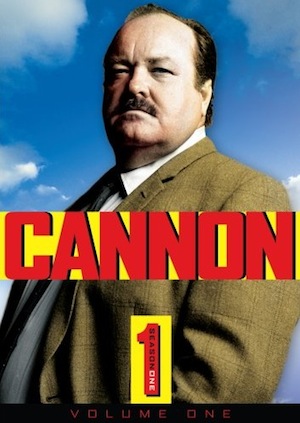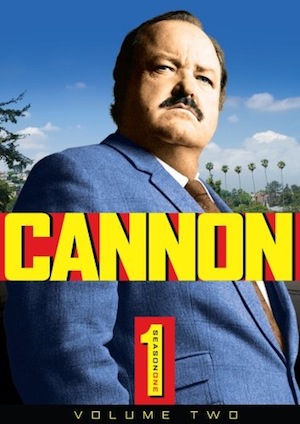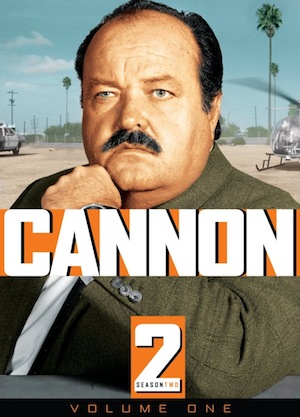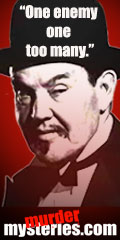Cannon
Cannon was a CBS detective television show, produced by Quinn Martin, that aired from 1971 to 1976. The title and lead character was private eye Frank Cannon, who was played by William Conrad.
Who was he? Frank Cannon was an LAPD detective, retired after the deaths of his wife and son in a car accident, now a private detective. We join him as he begins his new career (the pilot picked up after Cannon had spent 2 1/2 months on an overseas investigation). The cause of death of Cannon's wife and child was not clear through the first four seasons of the show. The first episode of the fifth and final season focuses on Cannon's investigation of the deaths, and he finally finds out how and why they were killed.
The conspicuously overweight detective had expensive tastes, especially in food and cars. (His favorite car was an ice-blue '72 Lincoln Continental Mark IV.) Throughout the series' run, the make of his car ranged from a Lincoln 1971 Mark III to a 1976 Mark IV, in various color schemes, all dark over light blue exteriors, with interiors that varied from red velour to dark-blue leather... Cannon's investigations were generally, but not always, for clients in Southern California; on occasion he was called in for more distant investigations (in New Mexico, for instance, for the pilot).
Despite his love of comfort and luxury, his work was dangerous and Cannon sometimes got hurt (shot or beaten) and knocked unconscious. He carried a gun, usually a snub-nosed .38 Special revolver. He sometimes subdued suspects with karate chops or judo holds, but he also used his huge belly as a weapon.
In the first two seasons Cannon was a pipe smoker. In the third season he was seen smoking only occasionally, and in the fourth and fifth seasons not at all.
The Barnaby Jones Tie-In
Frank Cannon's story arc involved his meeting with Barnaby Jones (Buddy Ebsen), an aging insurance company investigator who'd retired and turned his agency over to his son, Hal, who was subsequently killed. With the aid of Cannon and Hal's widow, Betty Jones (Lee Meriwether), Jones tracked down Hal's killer, and then decided to come out of retirement. The first episode of Barnaby Jones, "Requiem for a Son" was originally set to be a second-season Cannon episode, so that Barnaby Jones could qualify as a Cannon spin-off, but the show ended up being sold as a separate series, with the teleplay reworked so that William Conrad's appearance as Cannon came under the guise of being a special guest star.
The two shows featured a second "crossover" as well. The first part of a two-part episode, "The Deadly Conspiracy", aired as episode two of the fifth season of Cannon on September 17, 1975. Part two aired two nights later as the season four premiere of Barnaby Jones.
Decades before cell phones became commonplace, Cannon used a "mobile phone" in his car, which was exceptionally rare in the '70s. Cannon began his calls by asking the mobile operator to dial the call for him. The phone prop was a Motorola MTS mobile device.
William Conrad was nominated for Best Drama Series Lead Actor Emmys in 1973 and 1974, but lost to Richard Thomas (The Waltons) in the first year and to Telly Savalas (who won for Kojak) in the second.
The Quotable Frank Cannon
Frank Cannon was a great many things, but being at a loss for words was never one of them:
To a client: "OK, sir, I'll take your case and investigate what happened...But just remember, the truth is like rain — it doesn't care who gets wet."
To an underling of a crime boss: "Number one: I don't talk to pip-squeaks and Number two: I don't work for no $500."
To a client: "You have just asked the question that sends me right through the ceiling...I'd like to go one day without someone asking me: 'Can I trust you?'...Well, the answer is: 'No, no, you cannot trust me, why don't you try Lt. Hayes?'"
To a client: "Listen to me... When you withhold information from me, not only do you compromise my ability to investigate — but you make me appear as a jack-ass."
To the proprietor of the club where a murder victim worked: "Well surely you have his W-2 form?... Or doesn't your establishment worry about things like taxes."
To the same club proprietor: "Now tell me about Sam Gerritz... And not how he danced, but how he died."
At home at his apartment, to a black couple over for dinner: "What makes you think a person like me wouldn't enjoy soul food?... Just remember, when it comes to the soul, we do not count the calories."
On the phone to a crime boss whose thug Cannon has just beat up: "I guess you didn't send one of your better boys... You'll find him on the hood of his car."
To a man ready to commit his third murder: "You seem to have established your standard operating procedure fairly well."
To a sleazy bar-owner: "With what I could dig up on you in two days, I could put you away for 20 years... But lucky for you, I need to catch a murderer..."
To a teen-age punk who tells Cannon to mind his own business because his father is Chief of Police: "I'm sure he's really proud of you."
To a man about to reach into his pocket for a gun: "I suggest you don't do that, sonny."
To a police detective who thinks Cannon's client is a prime suspect because the murder victim owed her money and people get killed for owing money: "Well people get killed playing radios in bathtubs too."
On whether he'd take a case written into a will (the dead man stipulated that his death was to be investigated before dispersion of his assets): "I'll have to think about it... I've never been retained by a dead man before."
Coming to at sunrise after a nighttime car crash: "Where's my Egg McMuffin?... I want my Egg McMuffin!... Oh, my head"
To a mentally ill client who tells Cannon he feels like he's in a movie doing horrible things to people, but can't stop: "Maybe it's time you walked out on that movie."
To a guy named Dale who's about to be beaten up by a loan shark: "I said HOLD IT!... Who's the paper tiger, Dale?... Does he always maul his clients like that?"
Responding to an allegation that he was responsible for a senator's suicide (Cannon had exposed the senator ordering murders): "No... He did it all himself."
